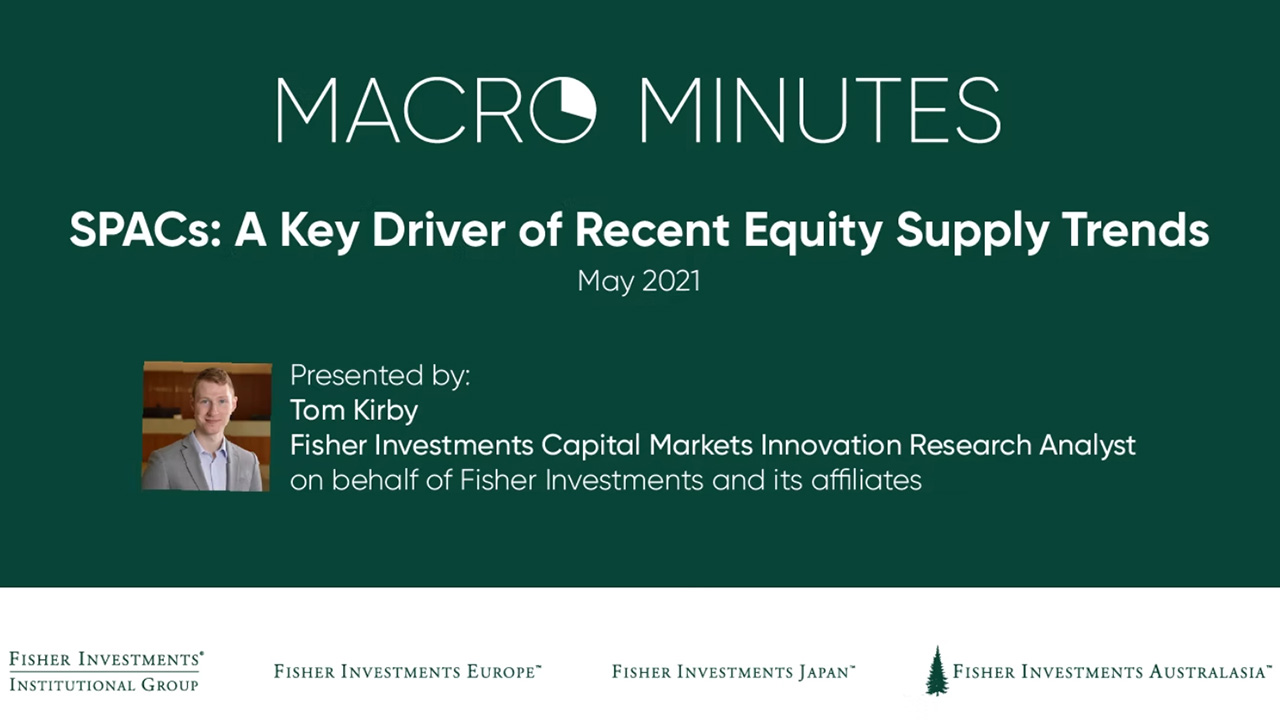Institutional Investing / Macro Minutes
Macro Minutes: SPACs: A Key Driver of Recent Equity Supply Trends

In May’s Macro Minutes video, Capital Markets Innovation Research Analyst Tom Kirby discusses recent equity supply trends, how Special Purpose Acquisition Companies (SPACs) fit into this big picture, and recent developments in the SPAC market.
Key Points
- Global aggregate equity supply expanded over the last 12 months.
- SPAC activity is a key factor of recent equity supply expansion, particularly in the US.
- Sentiment towards SPACs is recently challenged following increased scrutiny and poor performance.
Transcript
|
Visual |
Audio |
|---|---|
|
Title screen appears,” SPACs: A key Driver of Recent Equity Supply Trends” Underneath it is the presenter’s Picture, Tom Kirby. |
|
|
A man appears on the right down Corner of the screen. He is wearing a Navy suit and sitting in an office, He begins to speak. A Banner identifies him as Tom Kirby, Fisher investments Capital Markets Innovation Research Analyst, on behalf of Fisher Investments and its Affiliates. |
Tom Kirby: Since the 2020 bear market, the global supply of equity has expanded at a rapid pace alongside rising investor sentiment within the US. Tom Kirby: A key driver of recent equity supply expansion has been a record level of initial public offerings, including those of a type of blank check company called Special Purpose Acquisition Companies, or SPACs. My name is Tom Kirby, and on the capital markets innovation team within research Today we'll be covering global equity supply trends, how SPACs fit into that bigger picture, and importantly, recent developments within the SPAC market. |
|
On the screen a chart appears, the chart is titled “Where is Aggregate Equity Supply Today?” underneath the title is the following Comment” Total Supply Grew over the last 12 months, Driven by Issuance in US and China. The chart is showing Inflation Adjusted Net Change over the years 1996 to 2021. |
Tom Kirby: Before I dive into SPACs, I want to provide some high-level context on global equity supply, what goes into it, why it matters, and what it's saying right now. On this slide, you can see the trailing twelve month change in global equity supply, adjusted for inflation. And what this does is look at how many new shares are added into the market net of those being taken out, incorporating activities such as IPOs follow on issuance, buybacks, mergers and acquisitions, and much more. Tom Kirby: Equity supply merits very close attention for two primary reasons. The first being that it can provide some insight into investors sentiment. For example, the recent record level of initial public offerings suggest that we're in a late-stage bull market environment with rising optimistic investor sentiment. Second, expanding equity supply can weigh on share prices if it outstrips demand. Tom Kirby: We don't believe we're at that point yet on a high level, but we continue to monitor equity supply for this. Recognizing that equity oversupply has been historical cause of bear markets recently, we've seen equity supply expand at a very rapid pace, and that's primarily driven by trends within the US And China. As I mentioned before, we've seen record initial public offerings, but that's also been paired with elevated follow-on issuance and also muted offsetting activities such as buybacks. Tom Kirby: Over the next few slides, I'll talk a little bit more about SPACs, which have been a key driver in recent US. IPO issuance and us. Equity supply expansion. |
|
On the screen another chart appears, the chart is titled” How Large Has the SPAC Market Become?” underneath it is the Comment “Following Record IPO Volume, nearly $190B in Proceeds Awaits a Merger” The chart is showing SPAC Funds searching for targets ($B) over the years 2005 to 2021. |
Tom Kirby: Last year, SPACs raised a whopping roughly $80 billion in gross proceeds, and in just the first quarter of this year, SPACs almost matched that. Currently, roughly $190 Billion in gross proceeds awaits a merger with about roughly 40 billion of that. Having identified a target company through IPO, SPACs have added meaningfully to equity supply and going forward, there's a lot of SPAC dry powder out there currently competing for deals. |
|
On the screen a chart with a DataGrid next to it appears, the chart is titled “SPAC equity Multiplier effect to Complete A SPAC Merger” The DataGrid is showing top sectors For SPAC Mergers Completed in last 12m ($B). |
Tom Kirby: SPAC mergers typically expand equity supply beyond what was originally realized during their IPO process. This is shown on the left labeled as the equity multiplier effect. And what this shows is the total amount of SPAC mergers that have been completed in a trailing twelve month period divided by the initial proceeds they raised. And what this means is that SPACs have merged typically over the last twelve months with companies that are valued at over five times the amount that they raised during their IPO. Tom Kirby: SPACs are able to do this by issuing additional equity both to other investors or to the original owners of the target company with a high level of SPAC proceeds outstanding, completed SPAC mergers have the potential to push equity supply much higher than where it's at right now. We continue to monitor these deals very closely for their potential and realized impact on total equity supply. Tom Kirby: And we also look very closely at what types of companies are being introduced to the market through these SPAC mergers shown on the right. You can see that over the last twelve months, SPACs typically emerged with manufacturing, tech and financials firms, and these also have typically been lower quality More often than not, most of these companies have either had negative earnings or net income going into the deal. Tom Kirby: And so, through SPAC mergers we've seen recent equity supply expansion and with the amount of dry powder out there still, SPAC mergers have the potential to continue to push equity supply, specifically of tech, financials, manufacturing, and maybe even lower quality firms higher than where they're at right now. Tom Kirby: Audio info 3.2 |
|
On the screen, another chart appears, the chart is titled” what are the Effects of Recent Scrutiny?” underneath it the comment “Recent Scrutiny, Following Poor returns, May Mark a Shift in Sentiment Toward SPACS” The chart is showing the year-to-date SPAC VS. S&P performance. |
Tom Kirby: But sentiment towards SPACs has recently been challenged following increased scrutiny and poor performance this year. In April, the SEC made several announcements which likely impacted SPAC activity, including IPOs and mergers. First, the SEC made some clarifying statements about protections that SPACs believe they had. For example, SPACs believed that they had additional protections when making forward looking statements and projections related to their merger, but the SEC clarified that that's not likely the case. Tom Kirby: The SEC also made an announcement related to how SPAC should treat warrants on their balance sheet, and this led a lot of SPAC activity to be delayed as many SPACs scrambled to comply with those standards. This scrutiny is likely to continue going forward with a SPAC act introduced into the Senate, which would require SPACs to further disclose information related to compensation as well as the equity dilution that occurs during a merger with the SPAC. With heightened scrutiny following poor performance this year, April may mark a shift in sentiment towards SPACs. That month, you saw overall IPO and merger activity for SPACs drop substantially and not fully recover yet. Tom Kirby: It's too soon to tell where SPAC activity goes from here, but the recent shift in sentiment could be a positive for the market for two primary reasons. Tom Kirby: First, slowing SPAC activity hinders one key driver of recent equity supply expansion as a whole. Slowing equity supply expansion or even shrinking equity supply would be a positive for share prices. Further scrutiny for SPACs may improve the quality of companies that are approved to go public. And that as a whole would be good for stocks as well. |
|
On the screen the statement "Thank you for watching. If you'd like to learn more about our views, please reach out your relationship manager or Email FisherInstitutional@Fi.com” |
Tom Kirby: Thank you for watching. If you'd like to learn more about our views, please reach out your relationship manager. |
|
Investing in Financial Markets Involves The Risk of Loss and There is no Guarantee that all or any capital invested will be repaid. past performance neither guarantees nor reliably indicates future performance, the value of investments and the income from them will fluctuate with world financial markets and international currency exchange rates. The information in this document constitute the general views of Fisher Investments and its affiliates and should not be regarded as personalized investment advice or a reflection of the performance of fisher Investment or its clients. we provide our general comments to you based on information we believe to be reliable. there can be no assurances that we will continue to hold this view; and we may change our views at any time based on new information, analysis or Reconsideration. some of the information we have produced for you may have ben obtained from a third party source that is not affiliated with Fisher Investment. Fisher Investment requests that this information be used for your confidential and professional use. Data is month end and USD unless Stated otherwise. Fisher InvestmentFisher Asset Management, LLC, Doing Business as Fisher Investment (FI) is an Investment adviser Registered with the US Securities and Exchange Commission. As of February 28, 2022, Fi Managed Over $192 Billion, Including assets sub-Managed for its Wholly-owned Subsidiaries. Fisher Investments IrelandFisher Investments Ireland Limited (FII), an Irish private Limited Company, is Registered, along with its trading name, Fisher Investment Europe, With the Companies Registration office in Ireland (#623847 and #629724), and is regulated by the Central Bank of Ireland, with its registered address at: 2nd Floor, 3 George’s Dock, International Financial Services Centre, Dublin 1, D01 X5X0, Ireland. FII is Wholly-owned by Fisher asset Management, LLC, trading as Fisher Investment (FI), Which is Wholly-owned by Fisher Investment, Inc. FII outsources Portfolio Management to FI, FI’s Investment Policy Committee is responsible for all strategic investment Decisions. The Fisher Joint Investment oversight Committee is Responsible for overseeing FI’s Management of portfolios that have been outsourced to FI. This Material may also be found posted on the FII website at Institutional.fisherinvestments.com/en-ie. if you firm wishes to be removed from receiving these Materials in the future or wishes to pay for this material. please contact FII. This material has been approved and is being communicated by FII. Fisher Investment UKFisher Investments Europe Limited (FIUK) is authorized and regulated by the Financial Conduct Authority (FCA #191609), Trades Under the name Fisher Investments Europe, and is registered in England (Company #385093). FIUK is Wholly-owned by Fisher Asset Management, LLC, trading as Fisher Investment (FI), Which is Wholly-owned by Fisher Investment, Inc. FIUK outsources portfolio Management to FI. FI’s Investment Policy Committee is responsible for all strategic investment Decisions. The Fisher Joint Investment Oversight Committee is Responsible for overseeing FI’s Management of Portfolios that have been outsourced to FI. this Material may also be found posted on the FIUK website at institutional. Fisher Investments | Wealth Management Company. if your firm wishes to be removed from receiving these materials in the future or wishes to pay for this material, please contact FIUK. this material has been approved and is being Communicated by FIUK. |
|
See Our Institutional Insights
Stay on top of the latest investment trends and developments with our views and research.







